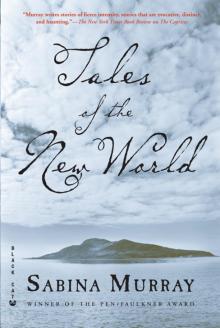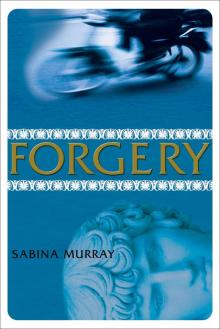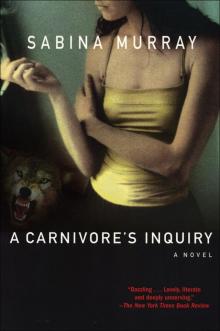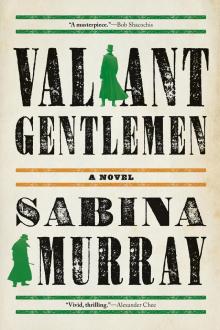- Home
- Sabina Murray
A Carnivore's Inquiry Page 2
A Carnivore's Inquiry Read online
Page 2
“You told me,” says Colón, “that at the mouth of that great river, you spoke to a man who had eaten three hundred men.”
“He had many enemies.” Vespucci thinks. “And now they have more.”
“We are their enemies?” Colón waves Vespucci off. “They hate us now, but we will change their minds.”
“I have little faith in that,” says Vespucci. “Your Indians pepper us with their arrows. The drumsong and howling is hardly done in gratitude.”
“Once the Indians are civilized, they will see what we have done for them.”
“Such generosity,” says Vespucci. “When I was at the court of Louis XI the Hugenots were rioting in the streets. The rebellion was put down. And after, the bodies of the Huguenots were butchered and sold as meat.” Vespucci thinks for a moment and then smiles. “Maybe you should go civilize the Parisians.”
“Maybe I should,” Colón laughs. “But there is nothing noble in that.”
“Noble?” questions Vespucci.
“We are helping the Indians,” says Colón. “We are their saviors. They have no faith. We give them our God. We give them medicine.”
“We give them disease. It is our duty to cure it.”
As usual, Colón noted, Vespucci bordered on sacrilege.
“We give them guns,” says Vespucci, “but only the barrel.”
“Amerigo,” Colón says in an almost fatherly way, “we give them civilization.”
“There is no civilization,” says Vespucci. “There is no New World.”
“Then you agree that Hispaniola is in Asia?”
“No, Cristóbal.” And Vespucci smiles and pats his friend’s arm. “I say Hispaniola is in Europe.”
Or maybe Vespucci said nothing of the sort. Maybe Christopher Columbus and Amerigo Vespucci argued and came to no agreement, or agreed that the Indians were all cannibals and worthy of condemnation, and, worse, conversion. Or maybe they ate in silence, shoveling the undistinguished food into their mouths without conversation, the hours spent waiting for an audience with the king having left them with a profound hunger.
What is the value of them arguing anyway? Vespucci and Columbus come to us as bedfellows, parts of a whole. History. Europe. Exploration. Colonization. America. The two discoverers are inseparable and we can no more divorce reasonable Vespucci from aggressive Columbus than we can live in thrall to intellect apart from appetite.
A train pulled in and the two protesting students got on with their signs. As they boarded, an old lady with gray curls was struck on the head, which I thought was a rather violent act. I might have even called the protesters’ attention to it, but they were gone, barreling back into the twenty-first century, and it was time for me too to get going. I saw Boris on the platform then. I didn’t recognize him at first, but thought perhaps I might have met him once, so I watched him quietly, unseen, from behind a pillar.
3
The city was shrouded in cloud and Boris was in a dark state. He stood armed with nothing but his green umbrella, battling a deep depression, which today he attributed to the rain. Boris looked up at life from the bottom of this mood as if he were trapped in a well—the view was limited and anything worthwhile seemed a remote possibility. People were belting him about the ribs with book bags; they were looking at the space on the wall behind him. He was invisible, nonexistent. Here in this tunnel there was no oxygen, only dirty light and the deep rumbling of the train. It was as though he were in a vast intestine and, beyond the tunnel’s bend, was a stomach about to purge itself. He took a pack of Rolaids from his pocket and consumed five. Boris glanced around nervously. He thought he must have been waiting a quarter of an hour at least, when it had only been five minutes.
I watched him from behind the pillar. The train arrived.
Boris seated himself and I sat next to him, in the only available seat. I could have stood, but I was tired from a combination of jet lag and the six demi-bottles of Chianti, courtesy of Alitalia.
We sat shoulder to shoulder with our eyes directed forward. There was a smell on Boris like pipe tobacco, but I detected no smoke. He breathed through his nose, which was so clotted with springy hair, little tendrils escaping his nostrils, that his breath whistled. He had his legs crossed at the ankles and when the train lurched, his knee bumped mine. Every now and then he would push his glasses up his nose with his thumb.
I recognized him then.
On the airplane I had lifted a woman’s Vanity Fair when she got up to use the restroom. On her return, she had watched me read it with an ineffectual outrage, but it could have been my magazine, so there really wasn’t anything she could do about it. Boris had been in the “Night Table Reading” section. He was listed as the author of Soulless Man. He was reading A Man without Qualities in the original German, which I suppose is something like Eine Man Ohne Qualities.
Boris caught me eyeing him and began rummaging around in his leather bag. He took out a magazine, plain pages, and began reading it intently.
“What are you reading?” I asked.
Boris looked over, annoyed.
“It is an Author’s Guild magazine. Not of interest to most people.”
“You’re Boris Naryshkin, aren’t you?” I said.
“Yes, I am.” He was surprised.
“I’m Katherine. I saw you once in a magazine.”
“Which magazine was that?”
“I can’t remember,” I lied. “It was some time ago.”
“What do you know about me?” he said.
“You write depressing books.”
“Have you read any of my books?”
“No. But I can tell that they’re depressing.”
“How can you tell?”
“By the way you sit.”
Boris smiled. “My editor says much the same thing and he has read everything.”
There was an awkward pause.
“Who do you identify with, Vespucci or Columbus?” I asked.
“Today?” said Boris. “Columbus.”
“Why?”
“Because I am not well-liked.”
“I like you.”
“You don’t know me.”
“It’s much easier to like people you don’t know.”
Boris, off-guard, smiled.
“You make your money depressing people?”
Boris nodded slowly.
“What a relief,” I said. “I just got back from Italy today. I spent the last year with men on vacation. Light-hearted men. Actually, they were shallow, which I suppose doesn’t exclude being heavy of heart. I can’t picture any of them depressed, or in a deep depression. Maybe a shallow depression.”
“A dimple,” said Boris.
“What?” I said.
“Dimple could be a word that means shallow depression.”
“So instead of getting depressed, these people get dimples?”
“Yes,” said Boris.
There was a moment of silence.
“Would you be interested in joining me for dinner?” he asked.
“I’d be delighted,” I replied.
Boris took me out to his favorite restaurant for some northern Italian food. I ordered a hare ragout. It came with salted gnocchi and a salad of wilted arugula and radicchio. Boris ordered something else, I’m not sure what, but he made a great deal of noise while he ate it. The wine was a predictable Chianti. Boris made a big show of sending back a bottle. I’m sure now that the wine that followed tasted exactly the same as the wine he refused. There was no conversation for a couple of minutes. I really didn’t know what to say. I was lost in my thoughts. Bored on the plane, I’d tried to picture what man my father would like to see me with least. I thought of the usual suspects: addict, musician, performance artist, his business partner. But Boris had to be the worst of them all—the European intellectual who would find my father inferior. I drank the wine down and poured myself another glass.
“You like the wine?” he asked.
“Oh yes. It’s wond
erful,” I said. “What do you think they did with the bottle you sent back?”
“I think they drink it,” said Boris.
“I’m pleased to hear that.”
“It is just a theory,” said Boris. “Why does it please you?”
“I’d hate to see it go to waste.”
“Even if it was bad?”
“Your vinegar, another man’s ambrosia,” I said, startled by the words, sure I must have heard them somewhere before.
“You are a relativist.”
I wasn’t sure what he meant. “Yes,” I said. “Is that bad?”
“Morally,” said Boris, without much conviction. He smiled. “How old are you?”
I smiled. “I’m twenty-two.”
“Why were you in Italy?”
“You don’t need a good reason to go to Italy. Everyone should go to Italy. Why aren’t you in Italy?”
“Because there is no money there, at least not for me.” Boris eyed me suspiciously. “Why did you come back?”
I pushed my ragout con lepre around my plate. “I got sick of the food,” I said and Boris smiled.
Boris had left Russia sometime in the seventies. I pictured Boris as looking much the same only slimmer, with more hair, wearing brown polyester pants. It was easy to convince the Americans—who hated the Russian government—that everyone had some pressing reason to escape. Some people did. Boris didn’t. He thought his opportunities were better in America. And they were.
“I learned English quickly because I speak French,” Boris said.
“Don’t you miss Russia?”
“No,” he said.
“Don’t you miss your family?”
“Most of them are dead. Here, I have started a new life. Isn’t that what America is for?”
“Sure, if you’re not American.”
Boris laughed again. “You make me laugh,” he said, as if it were a problem. He shifted his weight in the chair and looked around the room. He seemed nervous that someone would see us, but there weren’t that many people eating. It was early, around seven, too early to eat in the city. There was one large party, a family, complete with two grandparents, three middle-aged men, brothers, who all looked alike although slightly balder, fatter, or grayer than one another. There were three anxious wives to go with the brothers, one applying lipstick, the other two with chairs turned inward, wrapped up in some gossip. The table was littered with wine bottles and two small boys were hiding under the table hatching a conspiracy. At another table a woman picked at a salad while hammering away at her laptop computer. She looked like a lawyer. The sounds were all muffled and the dim light made every table seem strangely isolated, as if we weren’t really there. I wondered if the other diners felt the same way or if it was just my jet lag. I looked back at Boris and was surprised to see him there. He was done with dinner, done with the bread, and looked at me with frank suspicion.
“Tell me about Russia,” I said.
“What is there to tell?”
“You’re a writer,” I said. “Tell me a story.”
Boris regarded me closely then nodded to himself. He pushed back from the table and crossed his legs. “Once, when I was a small boy on vacation in Georgia, there was a place on the mountain,” he showed me the shoulder-height mountain, “where they did experiments on monkeys and apes. I was driving with my family on the road near the mountain. I don’t know how it happened, but all the animals had escaped. There were baboons running here and there, so we stopped the car. All of a sudden there is this, what is this, the big red one . . .”
“Orangutan?”
“. . . on the hood of my father’s car. He got up there and we stopped and he masturbated for half an hour. My mother was in the car. She covered my eyes. My grandmother was in the car. She started to pray.”
“Then what happened?”
“That’s the story. After that, it is not so interesting. We drive home. We read newspapers and brush our teeth.” Boris shrugged. “I grow up and come to America.”
“That’s it?”
“I die. I am buried and no one comes to my funeral. All my acquaintances say that I was a bastard and that they are happy now without me.”
“Wow,” I said, “that’s a great story. Tell me another.”
“First dessert.” Boris said. He glanced down at the dessert menu.
“Tiramusu?” I suggested.
He shook his head. “Not here. Here, we eat zuppa Inglese.” Boris raised his hand for no waiter in particular. “You tell me a story.”
“Me? About what?”
“You.”
“No,” I said. “I’ll tell you about her.” I looked over at the woman with her laptop. “She’s not really working. She’s alone and doesn’t want to look stupid. She’s typing, ‘How stupid it is to be alone. I make two hundred thousand dollars a year. You’d think I could find someone to eat dinner with me.’ She types that over and over.”
“That’s not a story,” said Boris.
“I’m not a writer. Tell me more about Russia.”
“Why this interest in Russia? Russia is just like America only colder and with less money.” The waiter came over and Boris ordered the zuppa, some coffee, some dessert wine.
“Please,” I said.
He nodded again and shrugged as if defeated. He took the last of the bread and with his mouth full said, “My great uncle Alexei was covered with violent scars.”
“Scars? How do you know they were violent?” I asked.
Boris smiled in a patronizing way. “Scars like this you don’t get from falling off your bicycle.”
“How did he get the scars?”
“From gunshots, from bayonets.” Boris ran his finger around the rim of his wine glass. “He did not say where he got these wounds.”
“But didn’t you know?”
“He was a quiet man. We would holiday together. There was a house by a lake,” said Boris. “He had strange habits.”
“What strange habits?”
“Uncle Alexei,” said Boris, “drank the still-warm blood drained from the necks of cows.”
“Why?”
“Because of his blood sickness.”
“Blood sickness? You mean hemophilia?”
“Maybe. He never said.”
“Drinking cow’s blood helped him?”
“Only when he drank it warm.”
“That’s not a story,” I said.
Boris shrugged and turned his attention to dessert.
I closed my eyes and pictured Uncle Alexei wrapping his aristocratic fingers around a clay cup filled with steaming blood. He was a thin man in his late sixties. His hair was white and carefully parted. His beard was trimmed to a refined point. He wore no shirt, but long woolen underwear. His back was pocked with scars. These oval-shaped scars had edges of raised, pink skin. The centers were sunken and the effect was that the man’s back was covered with two dozen unblinking eyes. His white skin had a bluish glow. His mouth was fine and his lips were thin and red. He brought the cup to his mouth and drained the blood, then fell back into his low chair. His eyes grew drowsy and one pale hand slipped to the floor, the palm tantalizingly open and upward.
“What are you thinking?” asked Boris.
“I think,” I said, “that you’re trying to seduce me.”
Boris pondered this. “Do you want to be seduced?” he asked.
“Possibly,” I said. “Do you have anything planned for this evening?”
I accepted Boris’s invitation to go back to his apartment for a glass of wine. On the walk home, I was still sober. I could feel that start of fall, an edge in the warm evening air. I held Boris’s arm, because he was stumbling a little, although he was unaware of it. He was talking about European philosophers, scholars, and writers, all of whom were his good friends, all of whom I was hearing of for the first time.
“You are very pretty,” he said. I took the keys from his hand and quickly unlocked the door.
Boris disappeared int
o the bedroom. The bathroom was off it and I could hear first Boris’s thundering urination and then a violent throat-clearing. I poured myself another drink and took off my shoes. I was sitting there patiently, with my feet on the sofa and my head on my knees, when Boris appeared at the threshold of the living room. He was solidly naked, which was surprising, although not that surprising. Boris was stocky and strong. He had wide feet with a high arch and an impressive spread of toes. Reddish hair sprouted from the tops of his feet and laced up his trunk-like legs, except for two or three inches of bare skin where his thighs met his groin. A street lamp through the open window illuminated a thick, blue penis lying like a robin’s egg in a nest of hair. Boris’s belly was round and hard, the belly of a satyr. His breasts were plump and slantwise on his chest.
“Do you mind if I finish my drink?” I said.
“No,” said Boris, now self-conscious. “Take your time.”
I was still weak, recovering from a flu that I’d picked up in Italy the weeks before my return to the States. I’d been in Rimini, which was on the east coast, just a short hop from Ravenna. Rimini, at the end of tourist season, had been moving into hibernation. Everything was disappearing: the noisy children, the bare-breasted grandmothers, the frutti di mare, and—most importantly—the vacationing men. I had struck up a relationship with a huge and handsome construction worker named Pietro, who was staying in a cheap room above the bar I frequented. Pietro returned from visiting his wife, who lived in the suburbs of Florence, to find that I had moved in. He was patient with my illness, even when I broke out in a patchy rash. I thought my skin was splitting and that some new me—although it looked remarkably like the old me—was emerging. I spent ten days in his room above the bar eating soft pasta with eggs and chicken soup, which Pietro made himself in the rooming house kitchen.
“What will you do when you are not sick?” he asked me.
“I don’t know, Pietro. Maybe I can move in with you and your wife. I could be your housekeeper.”
“You are not clean,” he said smiling. “Your clothes on the floor, hair in the sink.”
“I could be your cook,” I said.
Pietro shrugged. “My wife makes good food. You don’t. You don’t even eat.”

 Tales of the New World: Stories
Tales of the New World: Stories Forgery
Forgery The Caprices
The Caprices A Carnivore's Inquiry
A Carnivore's Inquiry Valiant Gentlemen
Valiant Gentlemen